How Cork women have shaped the English Market
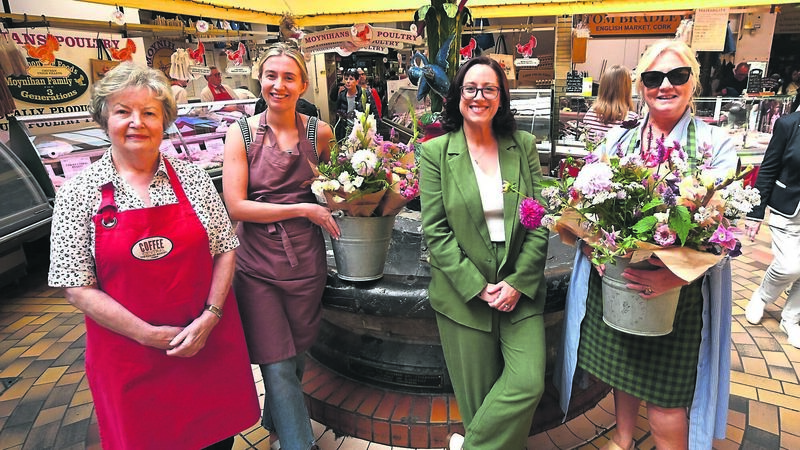
Traders Mary Rose Daly, of Coffee Central, and Harriet Murphy and mum Margot Ann Murphy ,of The Roughty, with (third left) Karen Lewis-Jones, who did a research project on the market for UCC. Picture: Larry Cummins
As Cork’s English Market celebrates 235 years of service to the city, focus turns to those traders who have a history of service to it of their own, passed between generations.
There is a specialness to these inter-generational market stalls, as though the good fortune of being born into them bequeaths some kind of exceptional understanding of what it takes to be a successful trader in the English Market.
Visit the Market today, and you’ll need an extra pair of hands to count the number owned and operated by women.
Presiding over an inter-generational stall passed from mother to daughter or father to daughter meant, as trade proceeded briskly over the counter, that life for women in Irish society changed beyond recognition.
In 2023, Cork-born Karen Lewis-Jones returned to her home city and began writing about these formidable, remarkable women stall holders of the English Market.
The result was a ground-breaking research project on the evolving role of women stall- holders in the market between 1950 and 2000 that completed her studies in Irish Food Culture at UCC.
A year on, I caught up with Karen to ask about her work, and why this perspective on Cork’s English Market is one that should be celebrated and recognised for the important role that women have played in the Market’s enduring success.
I started by asking what the research was about.
“I wanted to look at the role of women in food commerce in Cork. Ireland’s finest food emporium is the English Market, and I realised there was an uncaptured perspective on the role of women,” explained Karen.
I chose to look at 1950-2000 because it was a significant period of cultural and legislative social change in Ireland, especially for women.
The Market holds a nostalgic place in Karen’s heart and memory, too.
“I have always had a huge love for food and for me the Market is such a core memory, a key nostalgic part of my childhood.
“I always remember Friday was shopping day; going to the Market with my Nan and standing in queues six deep almost fighting to be served - and the banter!”
“When I became a mother myself, my relationship with my career and my working life changed dramatically. But then I uncovered these formidable women who, not only didn’t have the supports that I do, but had big families and just got on with the work.”
“I really wanted to make sure that I could get on paper the hard work and graft these women did in the English Market, and to try and capture a piece of history that would otherwise be lost and untold.”
By focusing on women stall-holders between 1950 and 2000, Karen was able to shine a light on stalls of two and three generations old. This is significant as it coincides with a time of seismic social change for women.
Provisions in the Irish Constitution and the Marriage Bar, part of the Civil Service Regulation Act (1924), had, for many women, closed the door to work and a career after marriage, consigning them to duties within the home as wife and mother.
The introduction of the Anti-Discrimination Pay Act in 1974 and access to parental leave from 1998 suddenly altered the social context of the lives of women - particularly married women - and their upward mobility in a growing economy as workers laid a foundation for rapid wider societal change.
However, says Karen, such things were of less consequence to the women of the English Market.
“They were business owners, and in effect that put them outside the legislation - they were creating their own destiny and saying they can crack on, and there had to be an element of bullishness to stand up for that.
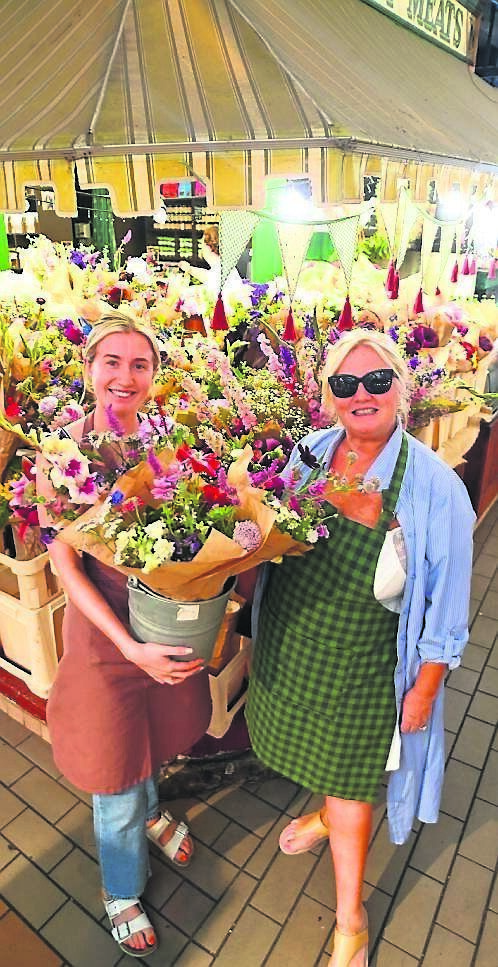
Everything that was going on from a legislative point of view was all about women in the home, and nothing has ever been captured about how these women have been responsible for making the English Market as iconic as it is today.
Karen selected four stall-holders to interview for her research: Pauline Mulcahy (Noonan’s Bacon), Margot Ann Murphy (Roughty Foodie), Mary Rose Daly (Coffee Central) and Daphne Roche (O’Sullivan’s Poultry).
Why these four women and what was so compelling about their stories?
“Before 1950, it was the shawlies, Cork’s women street traders. But then new laws came in that said they could no longer trade on the streets. I wondered, where did they go?”
“I knew Kathleen Noonan’s grandmother was street trading, and then Kathleen herself had set up a stall within the Market. I knew she was one of the older stalls, and I remember very distinctly the relationship she had with her daughters, and thought it was special. I wanted to uncover more of that.”
“Pauline (Mulcahy) herself is a very special lady; she’s got practically the smallest stall in the English Market, its traditional and still thriving. I don’t think the Market would be what it is today without the likes of Noonan’s still there.”
“I remember Margot Ann Murphy’s dad selling open boxes of Cadbury’s chocolate bars going four for a pound. I remember it as the Best Before stall. Margot Ann learned the trade as a youngster and developed this love of trading and being around people. Her father sold produce that was a sign of the times, but Margot Ann was seeing the likes of artisanal produce coming through, saw an opportunity with high end goods, and is now core to the English Market today.”
“Mary-Rose Daly had one of the oldest stalls in the market. She remembers one Saturday morning saying the dynamic of the Market is changing; people’s tastes are changing; how people were shopping was changing, and she could see her business wasn’t going to survive if she continued down that route.”
Mary-Rose saw a gap offering coffee after a visit to Italy and watching people “standing around having a coffee”, and taking the gamble it could work back in Cork.
“To us now, that doesn’t seem like such a hard thing to do, but it was huge to learn that kind of trade, and completely pivot the business. Now she has an exceptional stall that is needed and that can carry on the family name,” said Karen.
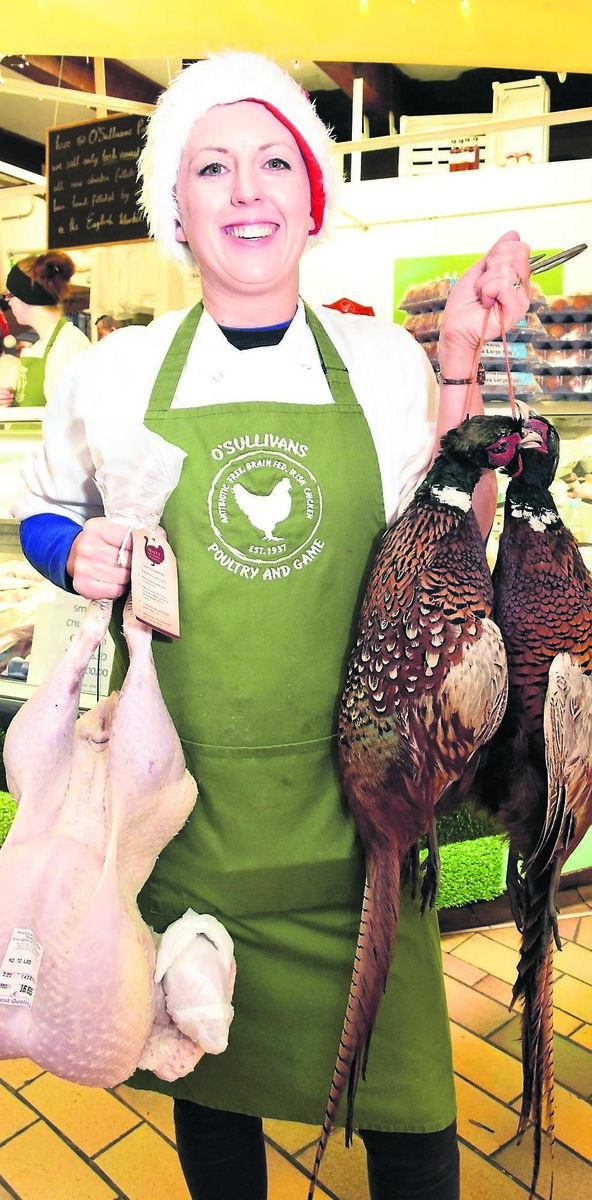
“I always found O’Sullivan’s Poultry fascinating. Daphne Roche’s mother, Glenys, took it over from Chrissy O’Sullivan (another superpower formidable woman). It felt like there were always strong women taking this work on. Although Daphne had trained as a manager in Dunnes, she still felt that the love she had for the stall and the connection she had for it from working there as a teenager was really pulling her back in.”
Daphne’s children have always been part of the stall, and, now older, work there too.
“It literally takes a village”, says Karen about these family businesses - the village, of course, being the English Market.
Karen says there is a sense of a shared love story these businesswomen have with the Market, but of course, to succeed amidst the bustle and clamour, cheek-by-jowl with other hard-headed traders, demands resilience as well as love.
The marriage ban had a big part to play in that. Once married, women were at home; they had no place in the workplace. I suppose that’s what made these women stand out.
“Pauline said there was a time when her mum was quite naïve, and was getting charged through the roof for certain bacon. But because she had known this person for so long, she thought he was grand. Of course, they were cutthroat and wanting to provide for their family, but at that time, it wasn’t always about profit - it was about relationships with customers and producers, and longevity. Those things had enormous value.”
“Of course, men play their part; but it’s the relationship they all have together as a community of traders. A lot of these women set up their businesses in a way that those who came after them could benefit - men and women alike.”
“I can’t say there was a direct correlation between the changes in Irish legislation [from 1950s on], but it seemed as though whatever was going on in the world outside of the walls of the Market, inside these women just got on with it to create their own empires. I felt that was remarkable and an uncaptured perspective.”
With any research, not everything unearthed makes it into the final report. But I wonder, of all that was learned, what was the most striking finding?
“I could have gone much bigger and carried it on. Every decade there seemed to be even more women I wanted to speak to, such as Kay Harte, who founded the Farmgate Café, or the legacy that Kathleen O’Connell left behind, or the likes of Mrs Moynihan.”
“It’s so important for all of them to be celebrated. Just because someone came from a family of traders doesn’t give a rite of passage to run a successful business. They’ve been through a lot, but they work together and have such loyalty to each other.”
“I keep coming back to the love and the passion these women have for the Market, and I just don’t think there is any place like it in Ireland. Through testing times over the years, they’ve just all kept their heads down and been providers. Cork is a better place for it.”
Although Karen’s visits to the English Market may be less frequent than as a child, it is a place that easily awakens her nostalgia and special memories of shopping for bodice from Noonan’s stall with her Nan.
“I love it all. I’m still a real traditional, nostalgic girl at heart. I’m the one eating the bodice and cabbage and bacon. But I also love the newness of it, or the smell of spiced beef at Christmas time. I love the buzz, its multi-culturalism, and how you could literally spend a month’s salary in one visit! I’m the one heading up to Farmgate Café and ordering tripe and drisheen, or the best chowder in the city. Or the smell from O’Flynn’s Sausages, and the best chicken wings - forty wings for €3!”
“There’s no place like it. I love that I can step inside and it’s like I’m an eight-year-old girl again.”
Amongst it all are the tenacious women stallholders that, Karen says, “somehow can do it all” with a sense of vocation.
Here is where they show the world what it means to do business with heart.
The Postgraduate Diploma in Food Studies and Irish Foodways at UCC is currently open for applications: www.ucc.ie/en/ace-pdfif

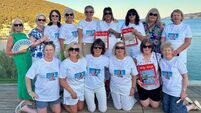
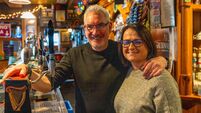
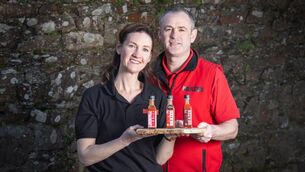



 App?
App?


